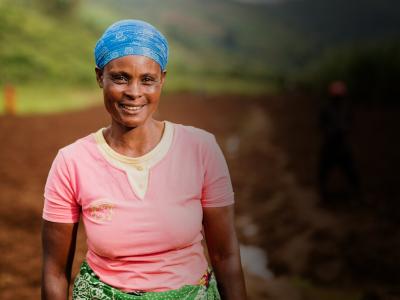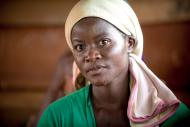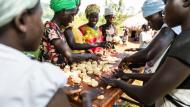Lasting peace cannot be brokered behind closed doors or traded for access to minerals. It must begin with justice, reconciliation, and long-term investment in communities—especially in women.
Even as the summer heat in Washington, DC reminds us that we’re only halfway through 2025, the scale of upheaval in diplomacy, security, and women’s rights tells a different story—one of regression, not progress. The year began with the United States abruptly freezing and then terminating the vast majority of its foreign aid programs, effectively shuttering the U.S. Agency for International Development. In short order, many donor governments followed suit, announcing steep reductions in their development assistance while simultaneously boosting military budgets.
On July 11th, the U.S. State Department’s restructuring plan—upheld after months of legal challenges—went into effect, slashing diplomatic capacity by more than 1,300 positions. Just as consequential, the restructuring eliminated entire offices responsible for Global Women’s Issues, Conflict Stabilization Operations, and Population, Refugees, and Migration. While the administration has pledged that regional bureaus will absorb these portfolios, no additional staff have been hired to take on these vital responsibilities. That leaves critical diplomatic priorities, especially women’s rights and peacebuilding, adrift, becoming just one more line item on an already overburdened desk.
The expertise and resourcing required for the US to continue its leadership role in advancing women’s equality and conflict prevention are being subsumed and deprioritized at a critical moment of rising global conflict and backlash to gender equality.
The consequences of these shifts are not abstract. For women living through conflict, these policy decisions are existential. Years of research confirm what feminist activists and conflict survivors have long known: gender equality is one of the most powerful predictors of peace. Gender-equal societies are more resilient to violent conflict and more likely to recover sustainably after war.
Cutting investments in women’s rights and participation—particularly investments in efforts led by women themselves—is not only a moral failure, but also a strategic one. Evidence shows that:
Women’s participation increases the probability of a peace agreement lasting at least two years by 20 percent and increases the likelihood of a peace agreement lasting 15 years by 35 percent.
Communities that are more gender-equal are less likely to turn to violence to resolve conflicts, and the inclusion of and investment in women-led civil society organizations supports the durability of peaceful solutions.
Yet that is precisely the opposite of what is happening. Women-led organizations, already receiving less than a sliver of global aid, are now watching what little funding they had disappear. In conflict zones like the Democratic Republic of the Congo (DRC), where sexual violence has spiked by more than 270 percent since the beginning of the year, the gap between need and response is becoming a chasm. There was already too little funding for gender-specific programming; now, women are falling through every crack in a collapsing system.
This reality was laid bare in the U.S.-brokered peace deal signed on June 27 between Rwanda and the DRC. Framed by the Trump administration as a diplomatic win, the agreement aimed to stem violence in Eastern Congo, where the M23 rebel group has made alarming gains. But many Congolese view the deal not as peace, but as capitulation. The deal’s omissions speak volumes. It contains no references to justice for survivors of conflict-related sexual violence, no mechanisms for accountability, and no meaningful participation from civil society.
“The truce might be tentative because local leaders and affected groups didn’t help negotiate it. The focus appears to be more on Congo’s mineral wealth and less on the victims of the decades-long conflict.”
- Vianney Dong, DRC Country Director for Women for Women International
Many are criticizing the peace deal’s focus on enabling the foreign extraction of the DRC’s vast mineral wealth and express concern that this could lead to further instability and violence rather than a de-escalation of the current conflict. Indeed, the Trump administration has been transparent in linking its interest in peace in the DRC to a more secure and prosperous America. The Administration is using minerals deals to advance U.S. interests in securing a supply chain of critical minerals that is independent from China, as it has previously pursued in Ukraine.
Women’s rights advocates have long warned that any peace process that excludes survivors and grassroots voices is unlikely to produce lasting stability. Nobel laureate Dr. Denis Mukwege condemned the agreement as a “scandalous surrender of sovereignty,” legitimizing foreign exploitation while ignoring decades of mass atrocities. A deal that fails to address conflict-related sexual violence and broader human rights violations, and that offers no meaningful support to survivors, risks entrenching the very conditions that fueled the conflict to begin with. It also ensures that women will continue to live without the safety, dignity, or justice that true peace should provide.
Take, for example, the omission of community involvement in planning the disarmament and reintegration of armed actors. Without such input, these top-down decisions may reintroduce known perpetrators of sexual violence and human rights violations into the same communities they once terrorized—this time under the guise of “peacekeeping.” Survivors may be forced to seek justice, services, or protection from the very individuals who inflicted harm upon them. And all of this unfolds without their consent or participation. What does “peace” mean in such a context? For many women, it means being silenced once again, this time under the banner of a peace deal they had no voice in shaping.
The U.S. decision to abandon grassroots peacebuilding and dismantle the very aid programs meant to support survivors only deepens this injustice. For example, Women for Women International had to prematurely end a critical project supporting survivors of sexual violence in the DRC due to the US's widespread and abrupt termination of foreign aid programs. That initiative, funded by USAID’s Bureau for Humanitarian Assistance, included support for women sexual violence survivors through safe spaces for healing and reintegration. One such survivor was Onya, a 23-year-old woman abducted by soldiers, gang-raped, and left traumatized. After isolating herself from her family and friends out of despair and shame, she eventually found her way to a safe space where she received medical referrals, psychological care, and the dignity of being heard. That program, along with many other programs, services, and infrastructure that support women like Onya, no longer exists.
This is not just about budgets; it is about whose lives we are willing to devalue.
The U.S. was the largest bilateral aid provider to the DRC. Its abrupt exit from that role has led to immediate, devastating consequences for the Congolese women, many of whom—like Onya—still hold out hope for a better future. Last year, 99 percent of the 818 women we surveyed in the DRC expressed optimism that their quality of life would improve. Yet they also identified their greatest obstacles: food scarcity, economic instability, access to healthcare, and war. None of these will be resolved by peace deals that ignore the voices of those most affected by protracted violent conflict.
Lasting peace cannot be brokered behind closed doors or traded for access to minerals. It must begin with justice, reconciliation, and long-term investment in communities—especially in women.
There is still a path forward. The U.S. Women, Peace, and Security (WPS) Act of 2017—built on the global Women, Peace and Security agenda driven by civil society—is law in the US. The WPS framework and legal provisions offer us the practical tools to embed gender equality into diplomacy, peace negotiations, and aid allocation. But its implementation still requires political will. Now is the time for the U.S. and its allies to reinstate and expand such investments in women’s rights and survivor-centered peacebuilding. If we fail to do so, we will continue down a path where peace is negotiated in name only.
Real peace cannot be solely transactional. It is participatory. It is just. And it must include women.



2fed.jpg?itok=MmfaDFX_)
